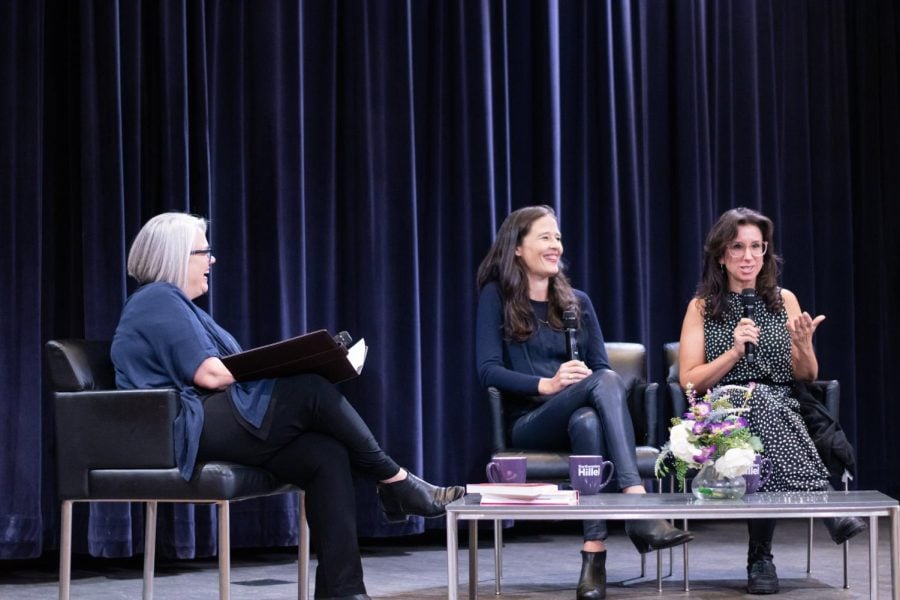Journalists Megan Twohey, Jodi Kantor discuss reporting on sexual harassment allegations against Harvey Weinstein
Photo courtesy of Northwestern Hillel
Northwestern Hillel hosted journalists Megan Twohey and Jodi Kantor to discuss their investigation into the Harvey Weinstein sexual harassment allegations on Monday.
October 25, 2022
Content warning: This story contains mentions of sexual assault.
In 2017, New York Times reporters Megan Twohey and Jodi Kantor uncovered decades of sexual harassment allegations against film producer Harvey Weinstein. Their investigation helped amplify the #MeToo movement, as people took to social media and other public platforms to share their experiences with sexual violence.
Five years later, Twohey and Kantor visited Northwestern on Monday to discuss the investigation and the importance of journalism. The event was co-sponsored by Hillel and the Medill School of Journalism, Media, Integrated Marketing Communications.
“When people ask us what was scary about the Weinstein investigation — for us, it wasn’t Weinstein himself. It was this prospect of failure,” Kantor said at the event. “There are all sorts of times when you let an investigation drop, but not when you think you know the truth and you just haven’t figured out how to prove it.”
In 2019, Twohey and Kantor published their book, “She Said: Breaking the Sexual Harassment Story That Helped Ignite a Movement.” The book documents the process behind their Pulitzer Prize-winning investigation.
Medill Prof. Patti Wolter, who moderated the discussion, asked Twohey and Kantor about the book’s film adaptation, set to release in theaters Nov. 18.
The movie depicts the job of journalists, Twohey said, but more importantly, it depicts the bravery of their sources.
“Sometimes, journalism movies skate over the sources,” Twohey said. “That’s not the case with this movie … They’re not always famous actresses. They’re women who are living by many measures, everyday lives, who played an extremely crucial role in this investigation.”
According to Twohey, one of the reasons the pair wrote the book was to pull back the curtain on investigative journalism. As the country has become more polarized, the general public has little understanding of what journalists do, she said. The two are sometimes asked questions about policy and laws related to the #MeToo movement. But at the end of the day, she said she and Kantor are not activists, but journalists.
While Twohey and Kantor have their own convictions and beliefs, they “check those at the door” when they report, Twohey said.
“While we are happy to engage in those conversations, we always make clear that you can’t solve a problem you can’t see,” Twohey said. “We think our jobs as journalists is to help bring the truth to light.”
Communication sophomore Jankhna Sura, who attended the discussion, said investigative journalism is one of the reasons why she wanted to attend NU.
Despite widespread criticisms of the media, the discussion emphasized the need for good reporting, Sura said.
“The uncovering of everything that Harvey Weinstein did is something that drastically changed how we view sexual assault from powerful men,” Sura said. “I was super interested to see the perspectives of the reporters who covered it.”
The pair emphasized the caretaking of sources throughout long-term investigative projects. Kantor encouraged aspiring journalists to find techniques that counter extractive journalism and give people the respect they deserve.
Though Kantor and Twohey were the primary narrators of the Weinstein story and “She Said,” they were not the only ones, Kantor said. As time passes, more people are discussing the ability of a small group of sources to make a difference, she added.
The stories of their sources, which some had buried subconsciously by the time the reporters spoke to them, were powerful enough to prompt a global uprising, Kantor said.
“It’s our goal to tell it as straight as possible, to let the sources speak for themselves, to leave really good records of what happened,” Kantor said. “We hope that one of the permanent takeaways is the power of hearing these stories and the power of facts to effect change.”
Clarification: This article has been updated to reflect the fact that the #MeToo movement existed before Megan Twohey and Jodi Kantor’s investigation.
Email: jessicama2025@u.northwestern.edu
Twitter: @JessicaMa2025
Related Stories:
— Medill students attend, learn from annual national journalism conventions
— Q&A: ‘The Assistant’ director Kitty Green talks the long shadow of Harvey Weinstein
— Panelists reflect on role of journalism in #MeToo Movement


